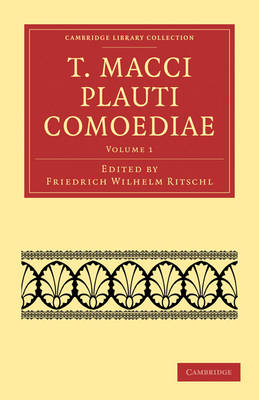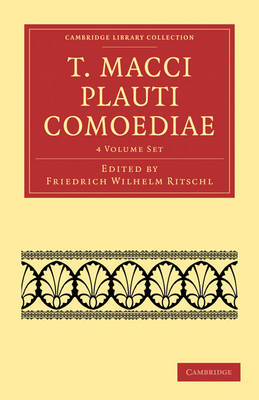Cambridge Library Collection - Classics
1 primary work • 6 total works
Volume 1
The foundation for the modern study of Titus Maccius Plautus rests on this monumental four-volume edition, begun by the eminent German philologist Friedrich Ritschl and completed by his colleagues Gustav Loewe, Georg Goetz, and Fritz Schöll. Scrupulously edited from existing manuscripts, including the famed Ambrosian palimpsest, this edition offers valuable insights into the metrics, literary and historical contexts, and textual history of the Latin comedic playwright. Volume 1 (1871–1881) includes Ritschl's indispensable overview of his critical method and his introduction to Trinummus, the only play he finished editing before his death, together with editions of Epidicus, Curculio, Asinaria, and Truculentus. Each play is provided with a preface, analysing the work's structures and themes and explaining its reconstruction from manuscript. A central contribution to the study of Plautine drama, Ritschl's Comoediae is also a remarkable achievement of textual criticism, a model of nineteenth-century philology at its most ambitious.
The foundation for the modern study of Titus Maccius Plautus rests on this monumental four-volume edition, begun by the eminent German philologist Friedrich Ritschl and completed by his colleagues Gustav Loewe, Georg Goetz, and Fritz Schoell. Scrupulously edited from existing manuscripts, including the famed Ambrosian palimpsest, this edition offers valuable insights into the metrics, literary and historical contexts, and textual history of the Latin comedic playwright. Volume 3 (1886-1889) contains editions of Bacchides, Captivi, Rudens, Pseudolus, and Menaechmi. Each play is provided with a thorough preface, analysing the work's structures and themes and explaining its reconstruction from manuscript. A central contribution to the study of Plautine drama, Ritschl's Comoediae is also a remarkable achievement of textual criticism, a model of nineteenth-century philology at its most ambitious.
The foundation for the modern study of Titus Maccius Plautus rests on this monumental four-volume edition, begun by the eminent German philologist Friedrich Ritschl and completed by his colleagues Gustav Loewe, Georg Goetz, and Fritz Schoell. Scrupulously edited from existing manuscripts, including the famed Ambrosian palimpsest, this edition offers valuable insights into the metrics, literary and historical contexts, and textual history of the Latin comedic playwright. Volume 4 (1890-1894) contains editions of Casina, Miles Gloriosus, Persa, Mostellaria, Cistellaria, and various fragments. Each play is provided with a thorough preface, analysing the work's structures and themes and explaining its reconstruction from manuscript. A central contribution to the study of Plautine drama, Ritschl's Comoediae is also a remarkable achievement of textual criticism, a model of nineteenth-century philology at its most ambitious.
The foundation for the modern study of Titus Maccius Plautus rests on this monumental four-volume edition, begun by the eminent German philologist Friedrich Ritschl and completed by his colleagues Gustav Loewe, Georg Goetz, and Fritz Schoell. Scrupulously edited from existing manuscripts, including the famed Ambrosian palimpsest, this edition offers valuable insights into the metrics, literary and historical contexts, and textual history of the Latin comedic playwright. Each play is provided with a thorough preface, analysing the work's structures and themes and explaining its reconstruction from manuscript. A central contribution to the study of Plautine drama, Ritschl's Comoediae is also a remarkable achievement of textual criticism, a model of nineteenth-century philology at its most ambitious.
The foundation for the modern study of Titus Maccius Plautus rests on this monumental four-volume edition, begun by the eminent German philologist Friedrich Ritschl and completed by his colleagues Gustav Loewe, Georg Goetz, and Fritz Schoell. Scrupulously edited from existing manuscripts, including the famed Ambrosian palimpsest, this edition offers valuable insights into the metrics, literary and historical contexts, and textual history of the Latin comedic playwright. Volume 2 (1881-1884) includes editions of Aulularia, Amphitryon, Mercator, Stichus, and Poenulus. Each play is provided with a thorough preface, analysing the work's structures and themes and explaining its reconstruction from manuscript. A central contribution to the study of Plautine drama, Ritschl's Comoediae is also a remarkable achievement of textual criticism, a model of nineteenth-century philology at its most ambitious.
The foundation for the modern study of Titus Maccius Plautus rests on this monumental four-volume edition, begun by the eminent German philologist Friedrich Ritschl and completed by his colleagues Gustav Loewe, Georg Goetz, and Fritz Schoell. Scrupulously edited from existing manuscripts, including the famed Ambrosian palimpsest, this edition offers valuable insights into the metrics, literary and historical contexts, and textual history of the Latin comedic playwright. Volume 1 (1871-1881) includes Ritschl's indispensable overview of his critical method and his introduction to Trinummus, the only play he finished editing before his death, together with editions of Epidicus, Curculio, Asinaria, and Truculentus. Each play is provided with a preface, analysing the work's structures and themes and explaining its reconstruction from manuscript. A central contribution to the study of Plautine drama, Ritschl's Comoediae is also a remarkable achievement of textual criticism, a model of nineteenth-century philology at its most ambitious.


